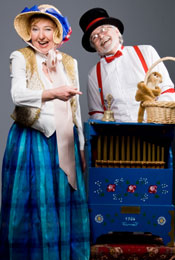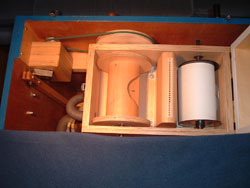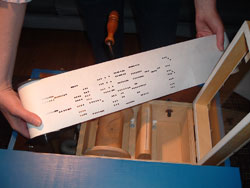|
 Since
the Seventeen-hundreds, from Italy to Northern Europe, traveling organ grinders
filled a specific role in social relations, literature, politics, and music.
They spread the news among the populace, often in Moritaten, irreverent songs
that were sometimes based on familiar melodies. Like the "yellow press" of
today, the organ grinders entertained and reported on scandals, sex and crime,
usually unauthorized by the authorities. They provided entertainment, by
popularizing simple melodies in their first form of reproducible mass-media. In
the 19th century, as literacy rates increased, news, romance, and adventure
tales were carried by the penny press, but the organ grinder remained a popular
form of "low" entertainment for the working class. Since
the Seventeen-hundreds, from Italy to Northern Europe, traveling organ grinders
filled a specific role in social relations, literature, politics, and music.
They spread the news among the populace, often in Moritaten, irreverent songs
that were sometimes based on familiar melodies. Like the "yellow press" of
today, the organ grinders entertained and reported on scandals, sex and crime,
usually unauthorized by the authorities. They provided entertainment, by
popularizing simple melodies in their first form of reproducible mass-media. In
the 19th century, as literacy rates increased, news, romance, and adventure
tales were carried by the penny press, but the organ grinder remained a popular
form of "low" entertainment for the working class.
Domestic workers,
factory workers who lived in harsh conditions, often far from home, cherished
the melodies and stories, which often depicted the fates of people like
themselves: jilted sweethearts, single mothers, homesick migrants. They enjoyed
hearing and singing along to songs of fantastic adventures of pirates, robbers,
warriors, and other outlaws. Narrative ballads like "Frankie and Johnnie",
"Mack, the Knife", or singing the Blues are a continuation of these
storytelling songs.
Of course, newer
forms of mass media and entertainment emerged in the 20th century, namely
radio, television, and, most recently, the Internet. On a technical level,
mechanical organs, which reproduce pre-recorded data, can be seen as early
applied forms and catalysts in the invention of new technology to store and
reproduce information.
Mechanical crank
organs have been built in Europe for over 200 years. However, organs are much
older than that. An organ mechanism that could be activated by hand, has been
documented as far back as the third century BC, an invention attributed to
Ctesibios of
Alexandria (285 - 222 BC) who discovered and applied the powers of
pneumatics. Another early description of a mechanical music instrument goes
back to Confucius, who describes in his work, "The Chinese Nightingale" an
organ-like instrument that could imitate such bird sounds.
The crank organ made
it possible to make music mechanically, to store the melodies, and to repeat
their performance many times over. Previously, only the mechanical clock or a
music box could do that.
 The
oldest existing cylinders that were used to record musical information
mechanically date back to a music automat made in Augsburg, Germany, from the
year 1600. Later, Emperor Frederick the Great (1740-1786) carried out an
unprecedented technological innovation initiative by inviting scientists,
thinkers, and craftsmen from all over Europe to settle in Prussia. He supported
no less than twenty-four music-box makers, whose task it was to build
sophisticated clocks with organ works, so-called music-boxes. As a sideline,
they developed crank organs. The first manufactures for crank organs date back
to the 1790's. The
oldest existing cylinders that were used to record musical information
mechanically date back to a music automat made in Augsburg, Germany, from the
year 1600. Later, Emperor Frederick the Great (1740-1786) carried out an
unprecedented technological innovation initiative by inviting scientists,
thinkers, and craftsmen from all over Europe to settle in Prussia. He supported
no less than twenty-four music-box makers, whose task it was to build
sophisticated clocks with organ works, so-called music-boxes. As a sideline,
they developed crank organs. The first manufactures for crank organs date back
to the 1790's.
 A mechanical organ
has three main components: the organ works with pipes and bellows, the play
action, and the exchangeable cylinders made of wood and/or metal that carried
the individual tunes. After the invention of the mechanical weaving loom,
folding punch cartons were developed to carry the music data, increasing the
repertoire more easily and cheaply; successively, hole-punched tapes or
paper-strips served as information carriers for the music. The newest
information carriers are microchips, which have become part of some crank
organs that are being built today. A mechanical organ
has three main components: the organ works with pipes and bellows, the play
action, and the exchangeable cylinders made of wood and/or metal that carried
the individual tunes. After the invention of the mechanical weaving loom,
folding punch cartons were developed to carry the music data, increasing the
repertoire more easily and cheaply; successively, hole-punched tapes or
paper-strips served as information carriers for the music. The newest
information carriers are microchips, which have become part of some crank
organs that are being built today.
Although technology
has made tremendous leaps, the basic principle of the crank organ remains the
same. It is a portable, mechanical music instrument, which has enough volume to
be heard on the street as well as indoors, without further electric
amplification.
Composers like
Mozart, Haydn, and Beethoven were not above writing melodies for "flute-clocks"
and other mechanical music works. They realized the potential of crank organs
as a first form of "mass media". The lowly organ grinder disseminated and
popularized their music among the public. Many of these melodies were sung and
whistled to, and became literally hits on the street.
Organ grinders had to
play for pennies, traveling form town to town, from market place to market
place, not to overstay their welcome. Especially in Italy, it was not uncommon
for a "patron" to adopt a child from a poor family, promising to give the child
work north of the Alps, and relieving the destitute family of one more mouth to
feed. Unfortunately, these children continued to lead a hard life: some were
trained as fiddlers or acrobats, but just as often as pickpockets, petty
criminals, and child prostitutes, beholden to their master. Maybe the least
talented ones were sent on the street to work as organ grinders?
Historically, organ
grinders were in the same social group as peddlers, ragmen, circus folk, just
above tinkers and gypsies. One of the most touching descriptions of a poor
organ grinder is in the last song of Robert Schumann's
"Winterreise",
Der Leiermann, a haunting and beautiful song cycle. Throughout the 19th
century, they were denied the limited civil rights that town residents might
have enjoyed: they were barred from many trades, from settling in town, from
owning property. But they also held a fascination for their listeners, and the
mystery of more freedom and of the courage to say things that were irreverent,
even dangerous. The playwright, Bertold Brecht, and composer Kurt Weill open
their "Threepenny Opera" with such an edgy organ grinder piece about the
underworld crime boss, MacHeath.
As industrialization
gave rise to the big cities with their large tenements and countless workers
migrating to their factories, the organ grinder was a common sight,
playing in the back alleys
of the tenements. Children, laborers, and domestic workers loved the
strains coming from the organ, and soon sang along with new and old familiar
melodies, not forgetting to
compensate the entertainer
for his labors.
Today, crank organs
have become a rarity; the street singer, belting Moritaten alongside, even more
so. Carrying on such an old folk art, is truly unique and worth cherishing, and
may give new life to this old popular art form.
Home | Bios | Music |
Performances |
History |
Photos |
Contact
|

